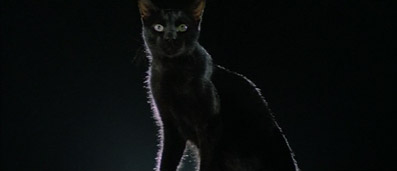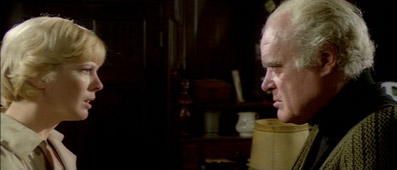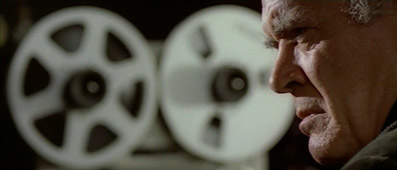|
Ah, Lucio Fulci. Back when I was reviewing his 1982 censor baiting New York Ripper, I briefly touched on the affection in which he is held by us hardcore horror fans. You want horrible visuals? Fulci will deliver. Check out his 1980 City of the Living Dead [Paura nella città dei morti viventi] if you're looking for evidence. A head is drilled, brains are extracted from skulls and eaten, and one woman vomits her entire digestive system, including her stomach. Lovely.
We thus tend to approach his films with specific expectations for their content. But do so with his 1981 Black Cat [Gatto nero] and you'll be in for a few surprises. You want gore? Forget it. A few nasty cat scratches and bloody faces is about all you'll get. And you know what? That's all that's needed here. No, really. Then there's the issue of location. We're not in Italy or even New York, Fulci's favourite second shooting home. Actually those cars look awfully familiar, so does that high street and that road sign. Yes, we're in England, and yes, that's Patrick Magee, he of the sinister frown and protruding chin, so memorable as Mr. Alexander in A Clockwork Orange and the unpleasant Alfredo in Masque of the Red Death. We like him. A lot.

If you know the Edgar Allen Poe story and the slew of similarly named films that have taken it as their inspiration, then you'll also be aware that being faithful to the source is rarely high on most filmmaker's priority list. My personal favourite example of this was also titled The Black Cat and directed by Edward G. Ulmer in 1934, a film that comes recommended for showcasing both Boris Karloff and Bela Lugosi at close to their best and for its notorious violence, but whose title character plays an only occasional and almost incidental role. A black cat figures large in Fulci's version, but Poe is once again all but ignored until the final ten minutes, hence the 'freely adapted' get-out clause in the opening credits.
The story has an attractively Hammer-esque quality. In a quiet English village, dark forces appear to be at work. A man is killed at the wheel of his car when a black cat jumps on board and seems to take control of his actions. A few days later, another local stumbles out of the pub in a drunken stupor and is attacked by what looks like the very same feline. He runs into an abandoned church but the cat pursues him and he falls to his death. And let's not forget the young couple looking for some privacy who take refuge in a boat house, where they are imprisoned, terrorised and killed. When the police investigate, there is evidence that the killer entered through a break in the air vent, but the hole is too small for a person to fit through.
Called in to investigate is brash, motorcycle-riding Inspector Gorely (David Warbeck) from Scotland Yard, who enlists the help of visiting American photographer Jill Trevers (Mimsy Farmer) to record the crime scenes, something she takes to without batting an eyelid. But she's more interested in Professor Robert Miles (Magee), a reclusive local medium whose hobby is recording the thoughts of the dead at the local cemetery. He's got this black cat, you see, one that he talks to in hushed and agitated tones, and there's clearly some hostility between them.
From the opening frames, Fulci favours atmosphere and suggestion over explicit violence. Given his reputation this might be seen as cause for complaint, but this is one of those times you should put aside your expectations of how a particular filmmaker will handle a story and judge the film on its own merits, and Black Cat has plenty of those. Chief among them is Sergio Salvati's delicious scope cinematography, which prowls at cat height in pursuit of human victims and transforms the village at night into the sort of place that horror would seem destined to spend a quiet weekend. Equally nifty is the editing, courtesy of old hand and Fulci regular Vincenzo Tomassi (his credits include Zombie Flesh Eaters, New York Ripper, House By the Cemetery and City of the Living Dead), who also cut Ruggero Deodato's notorious Cannibal Holocaust.

The story has all the right hooks, even if clarity is not always the plot development's best friend. There are also moments when you almost want Fulci to back up and expand on things, as with Jill's investigation of a crypt whose occupants clearly did not die a peaceful and dignified death. Her actions do help the plot along, even if they occasionally fly against logic. Sneaking in to Professor Miles' spacious house to look for clues to the killings may seem like a good idea, but it makes little sense to then announce your presence by switching on every tape recorder in the place and filling the house with the sound of ghostly voices.
In a functional but unexceptional cast that includes Egyptian actor Al Cliver as an English country police sergeant who sounds as if he's just flown in from Australia, Magee is the inevitable standout, and not just for his typically menacing scowls and stripped-of-inflection pronunciation. His character is a living library of intriguing but partially told stories, his relationship with the murderous cat one of mutual hatred whose roots are only hinted at, while his practice of recording the voices of the dead is fascinating enough to warrant a movie of its own. From the teasingly unsettling taster we get here, it could be a corker.
But the real star is the black cat itself,
which performs for the camera like the top flight graduate from
a feline RADA. Those scratching close-ups may be fake (smart
editing still delivers the necessary sting), but this cat
can open doors for real and hold a glare like an angry
hypnotist. It's my favourite animal performance in a horror
movie this side of the fence-leaping dog in Argento's Tenebrae.
Perhaps Fulci's greatest achievement in this very neat exercise in suggested menace is that he successfully presents
this animal – which is, after all, a domestic cat of normal
size and shape – as a dangerous creature genuinely capable
of harbouring evil intent.
According to the BBFC, the film has been passed uncut for this DVD release, but it seems likely that there is a version in existence somewhere with slightly more footage in the scene in which the two bodies are discovered at the boathouse. The evidence is in the editing, whose otherwise seamless flow momentarily falters here – the horrified scream of the mother is cut uncomfortably in half and the next scene jumped to as if the projectionist had laced up the reels incorrectly. The odd thing is that what we can assume is the missing shot, in which a body is shown in an unpleasantly decomposed state, is in the included trailer in its entirety.
Sometimes I can't help thinking that those wonderfully garish yellow box covers on Shameless DVDs suggest, at least to those who've had experience of some other indie labels dedicated to releasing lost gems, that the transfer contained within is going to be one of those ones we end up justifying the poor quality of on the basis of the film's rarity. Nothing could be further from the truth. Black Cat looks lovely here, an anamorphic scope transfer that does full justice to Sergio Salvati's splendid lighting camerawork. The colours are bright without over-saturation, the contrast is just right and the blacks are deep as a coal hole at night. Detail is also very nice, and there's hardly a speck of dust to be seen. There are two brief scratches, but neither will distract enough to cause complaint, given the plus points elsewhere.

The Dolby 2.0 mono sound is more like what you'd expect, with limitations in range and a slight background hiss and hum. Otherwise it's clear and free of damage and alarming pops.
Theatrical Trailer (2:55)
An interesting sell that includes at least one bit you shouldn't see in advance and the above mentioned footage of the boathouse victim not seen in the film.
One of the best releases yet from the
Shameless label and the sort of film that demonstrates beyond
question that Lucio Fulci was far more than a director of
gorily visceral horror movies. The print's in great shape
and although there's only one extra, its inclusion of that
(probably) missing shot makes it invaluable.
|